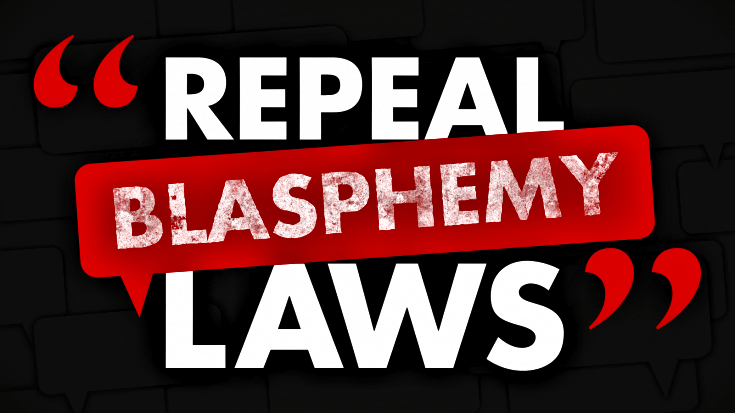Blasphemer DefinitionBlasphemer or Blasphemy shows contempt or disrespect towards a religious deity, symbol, or belief. In many parts of the country, this is considered a serious offense. The one who engages in this type of offense can face severe legal and social consequences. In simpler terms, Blasphemers are those who commit acts of "blasphemy". Blasphemers can originate from any religious background and can be motivated by a range of things, such as a desire to criticize religious organizations or practices or a lack of conviction in religious doctrines. 
What Consequences are Faced by Individuals Who are Blasphemer?In some of the major countries, Blasphemy is a serious offense, as discussed above. But those found doing the same thing face harsh penalties, including fines, imprisonment, or even the Blasphemer is sentenced to death. For example, in Pakistan, Blasphemy is punishable by death, and there have been several high-profile cases of individuals being accused of Blasphemy and subsequently facing severe legal consequences. Blasphemy ArgumentsMany people continue to criticize and question religious beliefs and institutions. Some contend that the right to free speech and expression includes Blasphemy and that people should be able to voice their opinions without fear of retaliation. Others argue that Blasphemy should be prohibited as a kind of hate speech that can provoke violence to protect religious minorities and promote communal harmony. They argue that blasphemy offenders must be held accountable for their actions and that harsh legal penalties are necessary to deter others from committing the same sin, regardless of opinions. New York and Massachusetts High Courts Upheld Blasphemy ConvictionsIn the United States, The First Amendment, a clause that safeguards the right to free expression and practice of one's faith, often deems legislation discriminatory. But there have been cases in the past where people have been found guilty of Blasphemy in particular states. For example, in 1843, the Court of Appeals maintained the New York blasphemy conviction of Universalist clergyman Abner Kneeland. Kneeland received a three-month prison term after being charged with rejecting the existence of God. The court determined that Kneeland had no constitutional right to make the words and that they were blasphemous. In 1830 Massachusetts Supreme Judicial Abner Cheney Goodell was found guilty of Blasphemy after denying that Jesus Christ was divine. Goodell received a six-month jail term. However, these instances are now seen as outdated and not representative of the current blasphemy legislation in the United States. Courts have frequently ruled in recent years that legislation against Blasphemy is unconstitutional and infringes on First Amendment rights. Backlash Against Anti-Blasphemy Laws
In recent years, the backlash has been growing against anti-blasphemy laws in many parts of the world concerns about the use of these laws to silence dissent, censor free expression, and single out marginalized groups have been expressed by human rights organizations, free speech activists, and religious minorities. Frequently criticized for being ambiguous and used to repress various speech and expressions, including acceptable criticism of religion and religious organizations. The capacity of people to communicate their opinions and beliefs can be constrained, which can stifle free speech. A significant campaign to abolish anti-blasphemy laws and increase rights for free expression and religious minorities has arisen because of these worries. Amnesty International and Human Rights Watch are the only two international human rights organizations that have demanded the abolition of blasphemy laws and more protections for minorities' rights to free speech and religion. In addition, certain nations have changed their blasphemy laws in response to these worries. For instance, Pakistan changed its blasphemy legislation in 2020 to provide more safeguards for persons wrongfully accused of Blasphemy, while Ireland repealed its blasphemy law in 2018. Purpose of Blasphemy LawsBlasphemy laws prohibit speech or conduct that is seriously offensive or disrespectful towards religious beliefs, practices, or institutions. These regulations frequently rest on the precept that religious convictions are holy and must be shielded from criticism, mockery, and contempt. Religious or cultural ideas frequently influence blasphemy laws and can serve as a reflection of society's prevailing ideals and perspectives. Blasphemy laws are often employed to safeguard the prevailing religion or to uphold social order by stifling opposing viewpoints or ideas. Furthermore, blasphemy laws are frequently criticized for being ambiguous and arbitrary, making it challenging to decide whether speech or behavior qualifies as blasphemous. This may result in abuses of authority and arbitrary application of the law. International Blasphemy DayThe Day came in observation on 30th September that was majorly created to promote freedom of expression and challenge the laws. The Centre for Inquiry (CFI), a nonprofit group that promotes science, reason, and secularism, was the first to notice it in 2009. International Blasphemy Day is a chance to bring attention to these problems and emphasize the value of free speech, particularly when debating religion. It is also a day to express sympathy for people subjected to blasphemy-related persecution or punishment and to stand in solidarity with them. Blasphemy in Terms of Religion
Blasphemy Laws in India
ConclusionFinally, it should be noted that the term "blasphemer" often refers to someone who disrespects or disregards a religion, its tenets, or its holy items. Religions have very varied ideas of Blasphemy, and what has been deemed an offense in one religion may not be in another. While some faiths consider Blasphemy a serious offense that may be punished, others emphasize a person's spiritual development and focus less on adhering to certain religious theories or beliefs.
Next TopicCorresponding Angles Definition
|
 For Videos Join Our Youtube Channel: Join Now
For Videos Join Our Youtube Channel: Join Now
Feedback
- Send your Feedback to [email protected]
Help Others, Please Share










